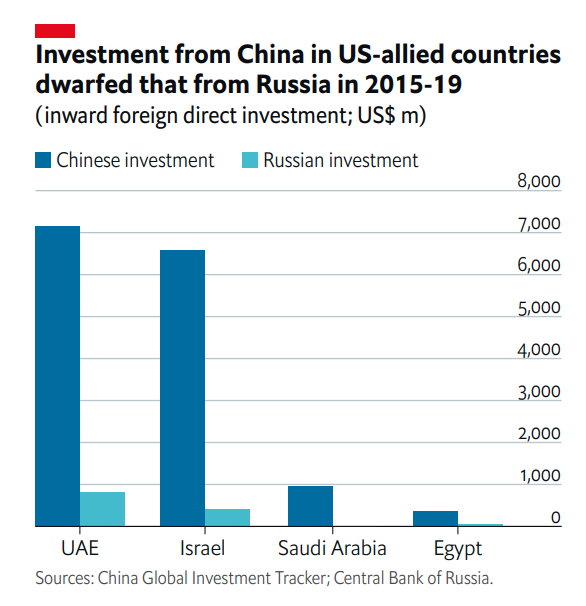Here’s Who’s Going To Profit The Most From USA Leaving the Middle East
Throughout August, America finally pulled out of Afghanistan, with it all the safeguards they thought they had put in place crumbled into dust. The Afghan Army, after years of training, dissolved. The President, Ashraf Ghani, fled the country, and Trump pretended like he had nothing to do with the whole thing. Everyone abandoned Afghanistan, and in so doing left a power vacuum that will have ripple effects across the Middle East as powers both local and abroad reposition themselves in America’s decreased presence.
There is still US presence in Iraq and Syria, and it’s not expected that they want to see a part 2 to the Afghan fiasco just yet, with Daesh still lurking around.
There are three contenders for who would benefit the most from the USA’s diminished presence in the region. The EIU released a report today breaking down who would be the big winners from Turkey, Russia and China.
Turkey
Of the three, Turkey has the least to gain, as it stands in a weakened position, probably not expanding its controls any further from what it has.
“In recent years Turkey has dramatically increased its hard power in the region, through actively interventionist military policies, most prominently in Syria in 2016 and Libya in early 2020. However, complex internal politics and the economic hit of the Covid‑19 pandemic make Turkey less likely to use financially costly hard power in the near term.” said the EIU report. “A key part of Turkey’s foreign policy revolves around securing access to gas reserves in the Mediterranean, which will require some dialogue with Egypt. As a result, Turkey’s near-term policy in the region is likely to focus partly on easing tensions with its main regional opponents—Saudi Arabia, the UAE, Israel and Egypt—rather than continuing its regional expansionism.”
Russia
The report noted that Russia is in a much stronger position to take advantage, having worked pragmatically across political lines
“The contrast of the US’s chaotic withdrawal from Afghanistan with Russia’s successful intervention and continued presence in Syria will allow Russia to emphasise its reliability as a partner. The result is likely to be Russia playing a more active role in regional diplomacy, as a means of increasing its global standing. In addition, a recent announcement by Saudi Arabia and Russia also highlights that modest diversification away from dependence on the US could allow Russia to gradually increase its arms sales in the region.”
China
 China though is the big winner. China isn’t particularly willing to play Mr Big Boy with Gun, leaving regional security dominance to the US. The Middle East is a key player in China’s Belt and Road Initiative, and is a vital chain the link from Asia to Europe and East Africa, providing China’s oil supply.
China though is the big winner. China isn’t particularly willing to play Mr Big Boy with Gun, leaving regional security dominance to the US. The Middle East is a key player in China’s Belt and Road Initiative, and is a vital chain the link from Asia to Europe and East Africa, providing China’s oil supply.
“A significant medium-term pick-up in Chinese economic activity in the region is likely for two further reasons. First, China has thus far managed to maintain a neutral regional security stance (aside from its rivalry with the US). As a result, it is an important partner for many rivals, including both Iran and Gulf states such as Saudi Arabia and the UAE. In a region where political disputes often influence economic decisions (the 2017 boycott of Qatar, for example), that neutrality is a considerable strength. Second, following the economic damage wrought by the pandemic and the 2020 oil price crash, financing an economic recovery and diversification away from dependence on oil are the most urgent priorities for most states at present. China is willing and able to offer much larger economic incentives than Russia, Turkey or the US to support those priorities.”
China indeed outspends Russia in the Middle East.
“Provided Iran secures US sanctions relief, Chinese infrastructure investment in Iran is likely to rise sharply in return for cut-price oil. At the same, the Gulf economies will build closer relations with China, while still balancing their alliances with the US, as a source of much-desired technology-sharing and external financing. Meanwhile, China’s growing influence will also put it in a prime position to secure reconstruction contracts in conflict zones like Libya and Syria. In the longer term, as its economic interests grow, geopolitical neutrality will become more difficult. But in the short to medium term, China’s interests in the Middle East will remain largely economic.”
The Bottom Line
So will we be seeing peace in the Middle East any time soon? With so many players trying to shape the outcomes of the region instability is pretty much assured unfortunately, no matter how much resource China or even the USA pours into the region.

